How To Clean A Guitar Fretboard With Household Items
What Will I Learn?
- What causes your guitar to develop dirt and how to prevent it.
- How to efficiently clean a guitar.
- Which products to use to clean a guitar without damaging its finish.
How To Clean a Guitar: Step-by-Step
Later in the article, we'll go into far more detail about the points below. But if you want to cut to the chase, then follow these concise steps to make your guitar shine like new!
- Wash your hands – It's obvious, but it's also the most important thing!
- Remove the strings – This will make cleaning the body and fretboard far easier.
- Clean the fretboard – Use fine steel wool to remove stubborn gunk from Rosewood/Ebony/Pau Ferro fretboards, and apply Lemon Oil to re-hydrate. Use a damp cloth to clean Maple fretboards.
- Polish the guitar body – For Poly-finished (gloss) guitars, spray guitar polish onto a soft cloth and wipe down. Use a dry part to buff out the polish. For Matte/Satin/Nitro-finished guitars, use only a dry cloth.
- Refresh the hardware – If you want your hardware to shine, use a soft cloth and a tiny amount of guitar polish to remove dirt or dried sweat. WD-40 can be used to remove thicker grime or rust.
How Does a Guitar Get Dirty?
The amount of dirt that your guitar builds up will depend a lot on the environment that you play the most in, and for how long. For example, if you're someone who goes out and gigs most weekends, then you're probably more than used to enduring 1000-degree stages and standing under enough lights to guide a plane in for landing. Playing an hour set under intense stage lighting makes you sweat – worst thing for your guitar!

Playing in this context causes you to sweat buckets, which is like kryptonite for your guitar. Sweat and grease on your guitar's finish not only looks pretty bad, but it can wear away the lacquer and cause irreparable damage to the fretboard in particular. It can also reach and harm your guitar's electronic components and hardware, causing rust and therefore even more problems.
If you practice between 1-2 hours a day at home in a cool and well-ventilated room, then your guitar will probably not require cleaning very often. It's all about the context and the conditions.
How Do I Keep My Guitar Clean?
Before we get into the nitty gritty of how to clean certain aspects of your guitar, it's worth mentioning methods that you can try to stop your guitar from building up grime in the first place. It'll save you time and effort in the future. Trust me!
Wash Your Hands Before You Play Guitar
Before I pick up my guitar, I always wash my hands. That's my life hack – and you guys can have it. But to be honest, lots of players already do this. However, you'd be very surprised by the number of musicians I've seen who have picked up their guitars after eating greasy food and then wondered why their axe is plastered in smudged fingerprints. Not to mention that the strings sound like rubber bands!
It's such a simple thing to do; not only keeping your guitar clean but also allowing you to eek more life out of your strings. This saves you both time and money, as you won't have to keep buying new strings and spend ages changing them! Just wait around 10 minutes for your hands to fully dry, then play away to your heart's content.
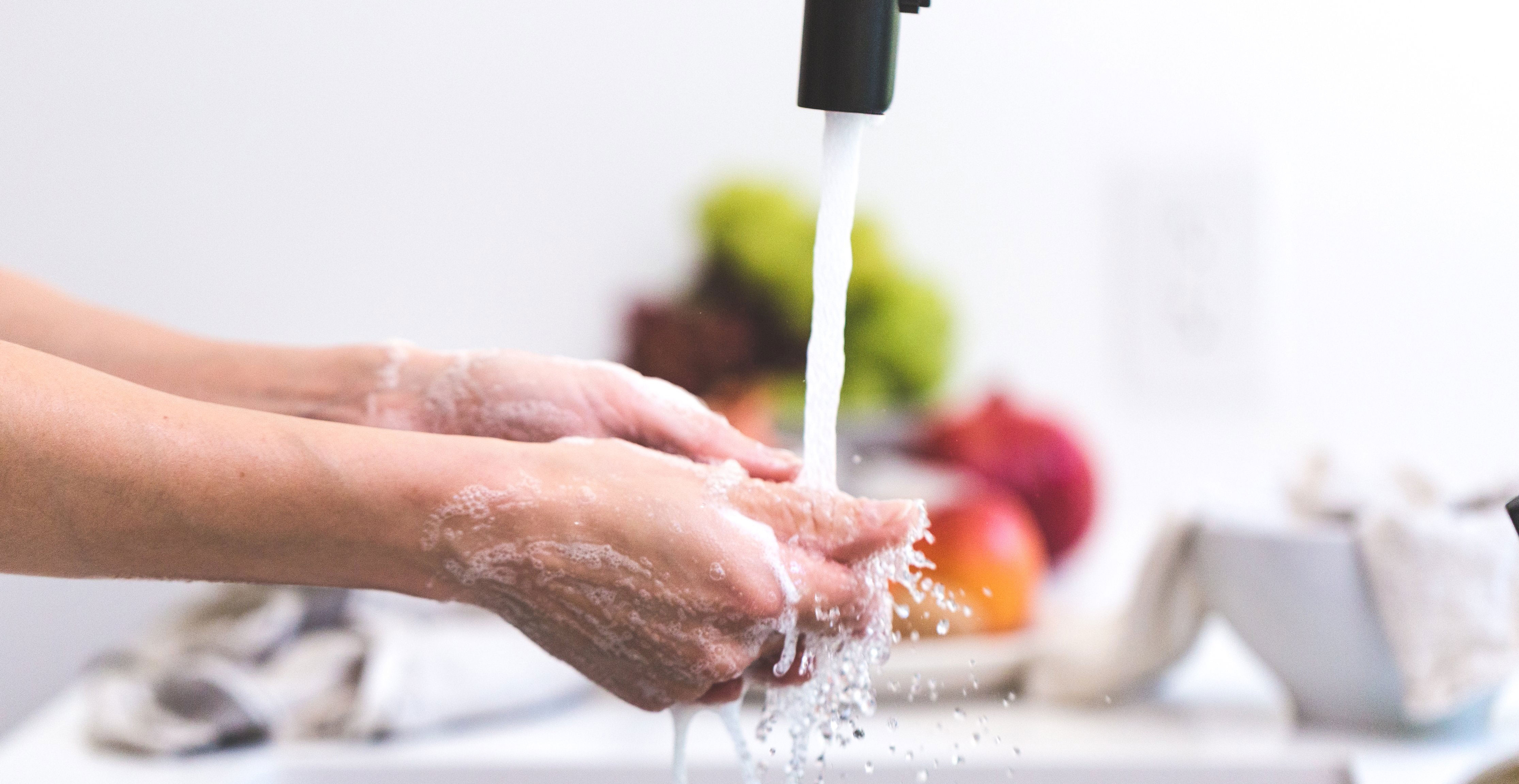
Wipe Down Your Guitar's Strings
Products such as GHS' Fast Fret or Jim Dunlop's Ultraglide 65 are great for extending the life of your guitar strings. Just apply these cleaning lubricants to the strings to remove any grime, and you will get sparkly-sounding freshness as well as a faster playing experience thanks to the smooth feel that they leave. These products also help to remove fingertip-induced dust and dirt from the fretboard – two birds, one stone!
Recommended String Cleaner Products
Keep Your Guitar In Its Case
You may not want to hear this, especially if you like to exhibit your guitars on the wall. However, the major downside of leaving your guitars out is that dust will easily accumulate on them. Dust isn't necessarily as big of an issue as sweat, but it can build up in the crevices of your guitar and affect its electronics and their functionality over time.
You know that crackling noise you've heard when moving your guitar's pickup selector or volume pot? Nine times out of ten, dust is causing that. This can be fairly easily resolved by removing the cavity plate on the back of your guitar and blowing the dust out, but if you own a Strat or a similar guitar where the electronics are attached to a scratchplate – this is more of a headache.
So, putting your guitar back in its case (whether a hardcase or gigbag) is recommended. It will keep your guitar mostly dust-free, and will ensure that it stays reliable and noise-free.
Recommended Guitar Cases & Gigbags
How To Prepare Your Guitar For Cleaning
Inevitably, your guitar will need cleaning at some point, even if you follow the above recommendations. You can clean your guitar without removing the strings, but a thorough clean may make this necessary – not to mention a lot easier! As a rule, I generally schedule cleaning my guitar with when a string change is needed. It just makes more sense. And speaking of strings, we currently offer 4 for 3 on all guitar strings!
4 for 3 on Electric Guitar Strings
So first off, wash your hands and set up an area to place your guitar. I'd highly recommend cleaning it in a well-lit space so that you can easily spot all of the imperfections that require the most attention. You can set up the guitar on a workbench or table/desk, or even just rest it on your lap if you prefer.
Recommended Guitar Setup Products
How To Clean a Guitar Fretboard
This is probably the most important part of your guitar to clean frequently. The fretboard is the part of your guitar that gets subjected to the most wear and punishment, and excessive build-up of sweat and dust can cause permanent damage if you're not careful.
When sweat dries and evaporates it dehydrates the wood, which can lead to cracks developing or the formation of everlasting marks. Below we have specified ways to clean the main fretboard materials that you'll find on most guitars.
Rosewood, Ebony & Pau Ferro Fretboards
Jim Dunlop makes a number of products that are perfect for cleaning Rosewood/Ebony fretboards. But if you've been super lazy and a lot of gunk has built up on your guitar's fretboard, then steel wool might be essential to use. If you do, then make sure to only use 0000 steel wool. It's fine steel fibres will remove any unwanted dirt without causing damage or wear to the frets. In fact, it will even polish them to an extent.
Before you use steel wool, make sure that you cover your guitar's pickups with masking tape to prevent the small metal particles from sticking to their magnets. Once you've done that, put on some latex gloves and gently rub the wool into the fingerboard making a circular movement for ultimate effectiveness. After you've completed this, wipe away any debris and make sure the surface is clear.
Now you can move on to conditioning the fretboard, which rehydrates the wood and deeply cleanses it to look just like new. Products such as Jim Dunlop's Guitar Fingerboard Kit or Lemon Oil are perfect for cleaning and conditioning. You can apply this with a damp cloth or toothbrush, or combine this with the previous step and rub it onto the board with steel wool. However, be generous with the amount that you use. What you don't want to do is completely drown the fretboard, as it will potentially cause warping issues. A little goes a long way!
Recommended Fretboard Cleaner Products
Maple Fretboards
Maple fingerboards are more susceptible to showing dirt and marks than Rosewood or Ebony boards, due to their lighter wood tone. And what adds insult to injury is that conditioner products cannot be used on Maple. So, what is the best way to clean a Maple board?
One of the best methods to clean an unfinished Maple fretboard is to use ultra-fine 0000 steel wool. This removes dirt without causing damage to the frets. A slightly damp cloth can also be used, especially on satin-finished maple, but generally avoid using anything other than this.
A Maple fingerboard that has been lacquered should be cleaned only with a damp (or dry) cloth. Using steel wool will take away the shine and leave a matte-like finish, while lemon oil will dull the finish and similarly take away the sheen. Strictly use a dry or lightly dampened cloth. You could even use a little bit of Jim Dunlop Formula 65 Guitar Polish if the lacquer is very thick.
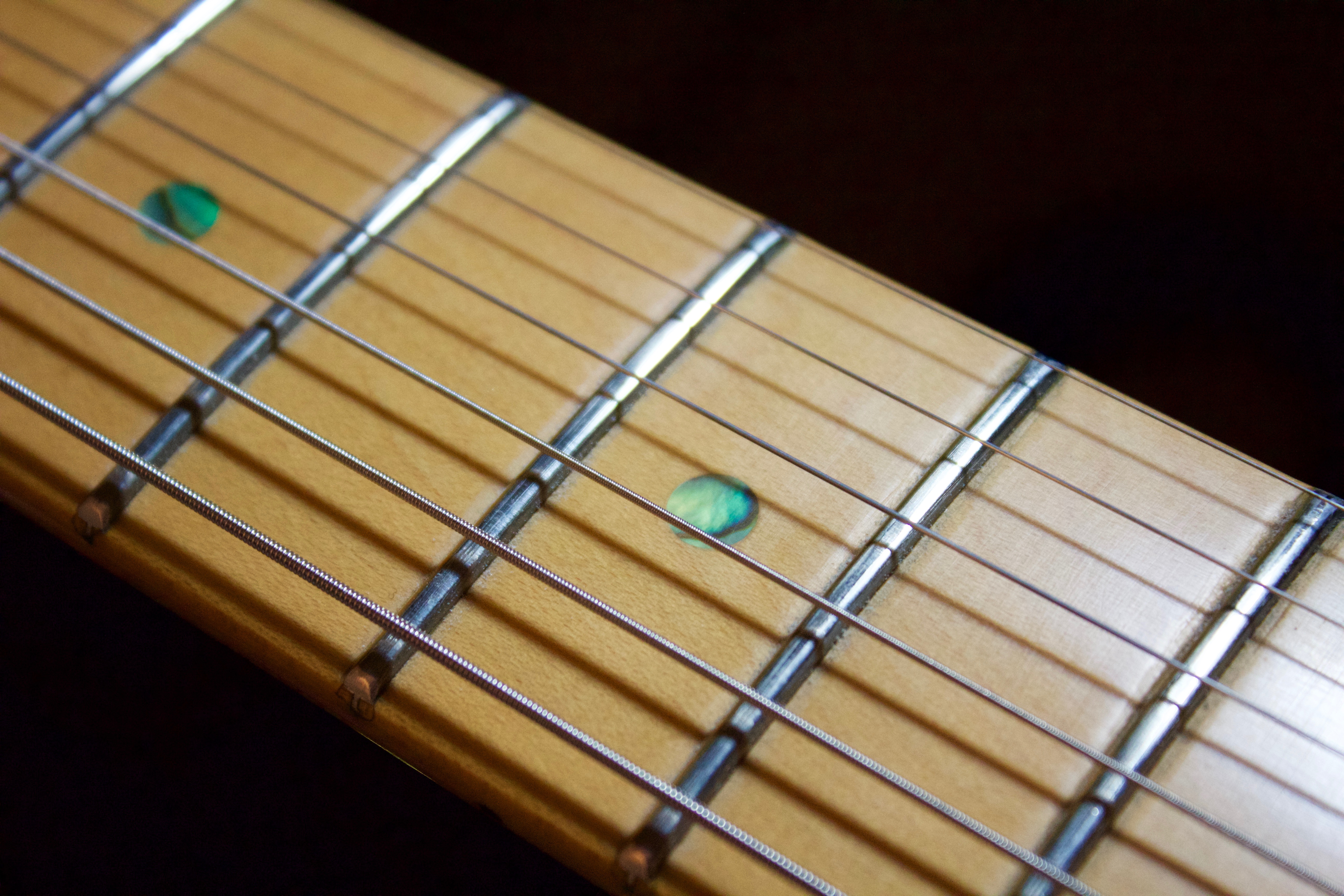
How To Clean a Guitar Body
It's unavoidable for the body of your guitar to build-up some marks and grease over time, no matter how careful you are. Luckily for you, the body is easier and less-intimidating to clean than the fretboard. However, the finish of your guitar's body must be considered too. So make sure to be aware of what type of finish it has before you go ahead and clean it.
For all of the finishes below, make sure to use a soft cloth when wiping down the body. The Jim Dunlop Polish Cloth is a great lightweight cotton cloth that you can easily store in your guitar case or gigbag.
Gloss & Poly-Finished Guitars
The majority of mass-produced guitars are finished in either a polyester or polyurethane finish, which gives a glossy protective layer to your instrument. This makes it the easiest finish to clean as it doesn't leave the wood porous or absorbent. You can therefore use a variety of polishes or waxes to give your guitar a look worthy of being in a showroom.
The industry-standard Jim Dunlop Formula 65 Guitar Polish is a great cleaner that you can use to wipe away any dried sweat or grease. It's best to avoid spraying it directly onto the guitar, so just spray a couple of times onto a cloth and then wipe down the guitar. Here is the process:
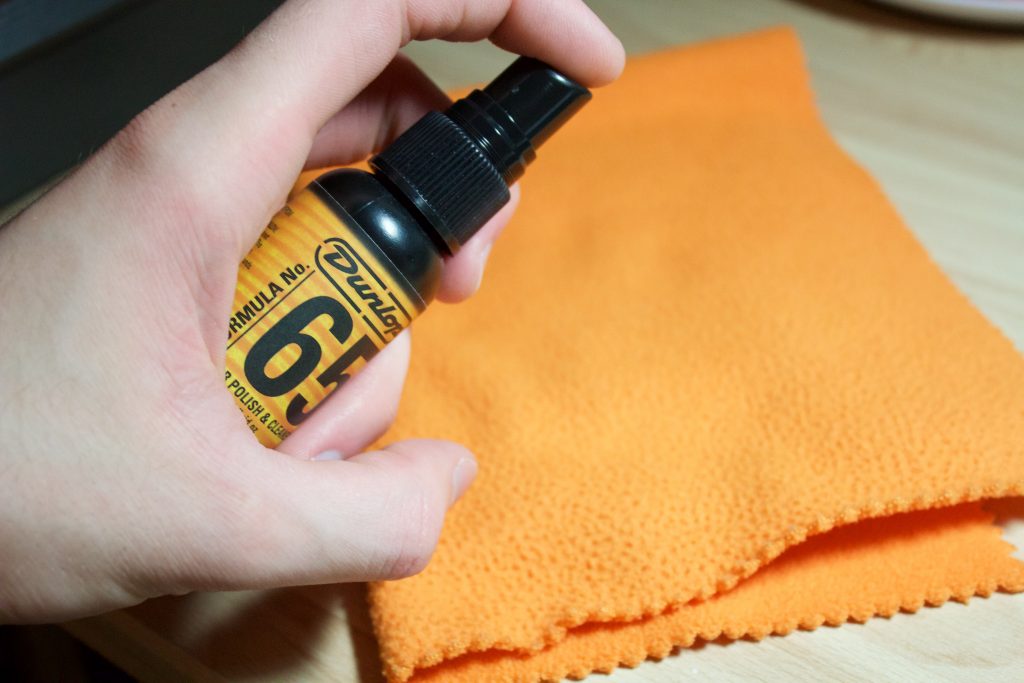
You can finish it off with some Jim Dunlop Platinum 65 Spray Wax for a professional "good-as-new" aesthetic if you want to. The great thing with the wax is that it provides a grime-resistant protective barrier for some time, meaning that your instrument will stay clean for a lot longer.
Remember to avoid using lemon oil or typical household cleaning products on guitars, as they contain substances that will dull and degrade the finish. It's almost always best to stick with specialist products when dealing with your pride and joy, so check out our full range of maintenance and cleaning products.
Recommended Guitar Cleaner Products
Matte & Satin-Finished Guitars
A matte guitar finish should only ever be cleaned with a dry cloth. If you have ever owned a matte-finished guitar, you'll know that over time the finish will wear down and shiny spots may start to develop where your hands have made the most contact with the instrument (such as above the bridge where your picking hand rests). This means that using a polish or wax will only exacerbate this problem, so it's best to wipe a dry cloth very gently onto the guitar's surface and to avoid cleaning solutions.
Satin-finished guitars have more of a semi-gloss look, but have a similar smooth feel to matte-finished instruments. Regarding cleaning guitars with a satin finish, the same process applies and only a dry cloth should be used. A slightly dampened cloth would also be okay if a really thorough clean is necessary.
Nitrocellulose-Finished Guitars
Nitrocellulose-finished guitars are more uncommon these days, however Gibson and Fender use this old-school finish on many of their high-end custom shop models. A nitro finish is considered to be more "breathable" for the wood, as it leaves it slightly porous and open on the surface.
This finish wears easily over time, and generally you should try and avoid using strong polishes to clean it. If you really need to, dampen a cloth with some water but make sure that it is fully wrung out beforehand.
Recommended Guitar Polish Cloths
How To Clean Guitar Hardware
Cleaning the hardware on your guitar is something you also have to be fairly careful with. Metals are prone to corrosion, and the salts in sweat and skin oils can cause rust to develop over time.
The most prone pieces of hardware on your guitar are the bridge, pickups and frets. Most guitarists rest their picking hand on the bridge, so dried sweat can develop on the saddles. The same applies with pickups that have open coils, and rust can start appearing if you don't pay attention to these areas.
It's best to clean hardware with a soft cloth using only a very light amount of guitar polish. The polish can help to remove any dirt, while the soft fibres in the cloth will bring the shine back. Just make sure to leave no polish residue on the hardware, as this could corrode the metal slightly. Hard to reach areas (like between string saddles on a tune-o-matic bridge) can be cleaned using a cotton bud – great for removing dust.
If the hardware on your guitar is very badly affected by corrosion or rust, then it might be best to remove those components and give them a more intense clean. WD-40 can be used to tackle thick grime and rust, applied using a toothbrush. If you do use this, then make sure that the pieces of hardware that you're cleaning have been removed from the guitar first. Getting this substance on the instrument could ultimately damage its finish.
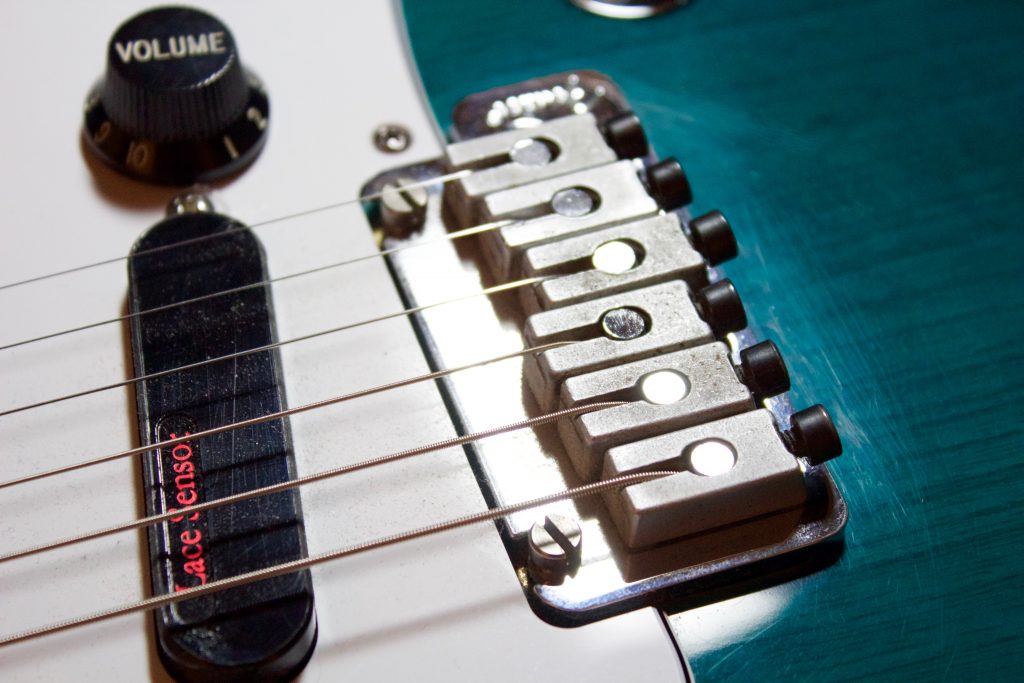
How To Clean An Acoustic Guitar
For the most part, cleaning an acoustic guitar is no different to cleaning an electric. You're unlikely to find acoustic guitars with Maple fretboards, however the majority of them will feature either Rosewood or Ebony boards like their electric counterparts. This means that lemon oil will suffice; not only cleaning the material but rehydrating it too – giving it a new lease of life!
Acoustic guitars can also be finished in protective polyester or polyurethane finishes too, but unlike electric guitars, you'll mostly come across natural or satin-finished acoustics. A lot of modern acoustics will have this finish as it is more porous, which lets the wood breathe. Tone-conscious acoustic aficionados believe that this results in a more resonant and open sound. Therefore, you should apply the same rules that I mentioned above for cleaning matte and satin-finished instruments. Generally, employ only a dry cloth and a little bit of water if you have to to remove stubborn marks. Job done!
Conclusion
A clean guitar simply looks and feels better than a dirty, grubby instrument. It's imperative to keep your guitar clean if you want it to last, and to prevent replacing any of its parts in a few years time. Remember this: look after your guitar and your guitar will look after you.
Interested in finding out more about music gear and expanding your knowledge? Click here to view all of our Learn articles.
Recommended Guitar Cleaning Kits
How To Clean A Guitar Fretboard With Household Items
Source: https://blog.andertons.co.uk/learn/how-to-clean-a-guitar
Posted by: trippcopievere.blogspot.com

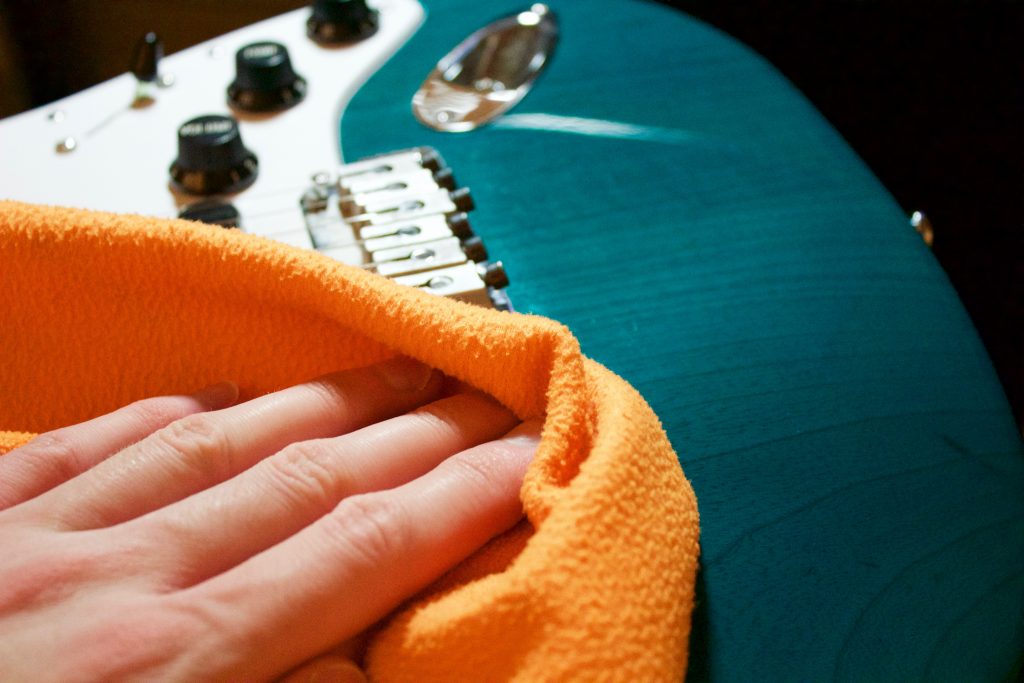
0 Response to "How To Clean A Guitar Fretboard With Household Items"
Post a Comment